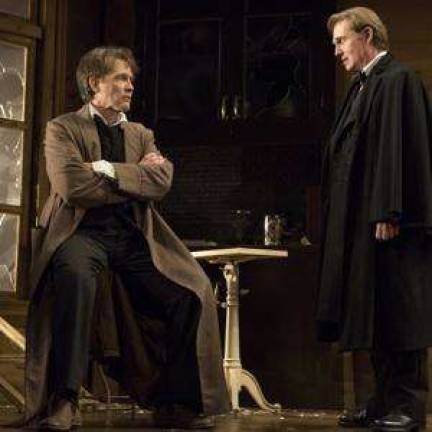The Trouble with the Truth: "An Enemy of the People"

You can always count on Boyd Gaines. This polished, subtle journeyman actor has enjoyed the stage career that has run the gamut from a slick magazine editor to a shy store manager to a show biz agent ? and brought him four Tonys as a result. There is really no character, genre or time period that Gaines seems unable to imbue with vivid life and credibility, making him the perfect actor to shade in all the gradients about the supposed "good guy" he plays in Dough Hughes' An Enemy of the People, the Henrik Ibsen revival currently playing at the Samuel J. Friedman Theater. Gaines is Dr. Thomas Stockmann, a once-struggling Norwegian doctor who has found successes the staff physician at the spas that provide this small town with its income. When he finds out that the waters therein come loaded with toxins, he feels that it is his duty to come forward, not just to save lives, but also to appear as a very public hometown hero. Hughes blocks Gaines so that he prances around the stage with unfettered glee; his discovery is a win-win! Imagine his surprise, then, when Peter (Richard Thomas), the town's mayor and captain of the profitable spa, insists that Thomas' findings must be suppressed or else they will deprive the town of its major cash cow. That not harsh enough? Oh yeah: Peter is also Thomas' brother. At loggerheads, this battle of wills eventually trickles down throughout the town just like the poison in its waters. A no-nonsense Peter is able to persuade (okay, pressure) local newspaper editor Hovstad (John Procaccino) and Aslaksen (Gerry Bamman), the powerful town printer, to his side. Peter also threatens the livelihood of Thomas' family ? if Peter loses his professional perch, his wife Catherine (Kathleen McNenny) and daughter Petra (Maïté Alina) will return to poverty. Rebecca Lenkiewicz's modern adaptation begs the question: when is being right the wrong thing? (Fun fact: the police chief Martin Brody in the film adaptation of Jaws counts Dr. Stockmann as one of its influences.) For all his meticulous research and study, Thomas underestimates the need of appealing to the emotions of the masses. Enemy follows a similar structure to Friedrich Schiller's Mary Stuart. The first act is largely a benchwarmer, setting up second-act fireworks between its two leads, though it's an unbalanced war. Thomas is not only morally right, his internal battle of whether to uphold his convictions is far more fascinating than the more pragmatically-minded Peter. And Thomas the actor has difficulty providing the same kind of dimension to his character that Gaines brings to Thomas the character; Peter is more rigid and less textured. McNenny and Procaccino both add keen insight into tough calls one must make the good of the one does not equal the good of the many. Hughes' production could stand to be trimmed a bit (having a shorter first act eventually makes the second one feel a bit over-extended ), but it boasts the flashy technical works one expects from Manhattan Theater Club: a sharp rotating set from John Lee Beatty, moody, specific lighting courtesy of Ben Stanton. And while sparks do fly in the play's second act, they do mostly when the town has turned on Thomas, shouting the play's title as part of an angry mob, rather than when the two brothers go head to head. Lenkiewicz does cut to the heart of the matter, in questioning just what individuals are best-equipped to make decisions for a society, and if it is possible for anyone in such a position not to be corrupted by it. Still, it's performance, not politics, that shines in Enemy. Gaines' character may warn against the water, but I'll drink from this transcendent actor's cup any day. An Enemy of the People Samuel J. Friedman Theater, 261 West 47th Street, Manhattan, (212) 239-6200, mtc-nyc.org, Through Nov. 11.